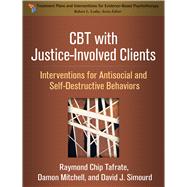Grounded in science and clinical experience, this treatment planner provides essential tools for conducting cognitive-behavioral therapy (CBT) with justice-involved clients in a wide range of settings. Guidelines are presented for assessment, case formulation, and intervention to alter criminogenic thinking and destructive lifestyle patterns. With a focus on reducing recidivism, the book demonstrates ways to enhance clients' motivation for change and elicit prosocial values and life priorities. Practitioner-friendly features include case examples, recommended assessment instruments, over 35 sample scripts, and 27 reproducible forms and worksheets; the large-size format facilitates photocopying. Purchasers get access to a Web page where they can download and print the reproducible materials.

CBT with Justice-Involved Clients Interventions for Antisocial and Self-Destructive Behaviors
by Tafrate, Raymond Chip; Mitchell, Damon; Simourd, David J.Edition: 1st
Format: Hardcover
Pub. Date: 2018-05-25
Publisher(s): The Guilford Press
List Price: $72.53
Buy New
Usually Ships in 5-7 Business Days
$72.17
Rent Textbook
Select for Price
Rent Digital
Online:
180 Days access
Downloadable: 180 Days
Downloadable: 180 Days
$30.38
Online:
1825 Days access
Downloadable: Lifetime Access
Downloadable: Lifetime Access
$50.63
$30.38
Used Textbook
We're Sorry
Sold Out
Summary
Author Biography
Raymond Chip Tafrate, PhD, a clinical psychologist, is Professor of Criminology and Criminal Justice at Central Connecticut State University. He co-chairs the Forensic Issues and Externalizing Behaviors special interest group for the Association for Behavioral and Cognitive Therapies, is a Fellow and Supervisor at the Albert Ellis Institute in New York City, and is a member of the Motivational Interviewing Network of Trainers. Dr. Tafrate frequently consults with criminal justice agencies regarding difficult-to-change problems such as anger dysregulation and criminal behavior. He has presented his research throughout North America, Europe, Asia, and Australia, and has published numerous journal articles, book chapters, and books.
Damon Mitchell, PhD, a clinical psychologist, is Professor of Criminology and Criminal Justice at Central Connecticut State University. As a criminal justice consultant, Dr. Mitchell has developed and delivered training workshops related to forensic assessment and treatment and has conducted evaluations of criminal justice programs. He has published numerous journal articles and book chapters as well as a coedited book.
David J. Simourd, PhD, CPsych, is in private practice in Kingston, Ontario, Canada, and has been involved in forensic psychological assessment and treatment since 1992. In addition to his clinical work, Dr. Simourd has published articles, delivered training workshops, and served as a consultant on offender assessment and treatment to a variety of correctional organizations throughout North America, Asia, and the Caribbean. He is on the editorial board of Criminal Justice and Behavior and is a member of the Ontario Review Board, the civil commitment board for mentally disordered offenders in Ontario.
Damon Mitchell, PhD, a clinical psychologist, is Professor of Criminology and Criminal Justice at Central Connecticut State University. As a criminal justice consultant, Dr. Mitchell has developed and delivered training workshops related to forensic assessment and treatment and has conducted evaluations of criminal justice programs. He has published numerous journal articles and book chapters as well as a coedited book.
David J. Simourd, PhD, CPsych, is in private practice in Kingston, Ontario, Canada, and has been involved in forensic psychological assessment and treatment since 1992. In addition to his clinical work, Dr. Simourd has published articles, delivered training workshops, and served as a consultant on offender assessment and treatment to a variety of correctional organizations throughout North America, Asia, and the Caribbean. He is on the editorial board of Criminal Justice and Behavior and is a member of the Ontario Review Board, the civil commitment board for mentally disordered offenders in Ontario.
Table of Contents
I. Forensic Basics
1. The Forensic Treatment Landscape
2. An Integrated Forensic Cognitive-Behavioral Therapy Approach
II. Engagement
3. Successfully Engaging Justice-Involved Clients
4. Clarifying Values and Life Priorities
III. Assessment, Case Formulation, and Focus
5. Assessing Criminal Risk Domains
6. Case Formulation
7. Establishing Collaborative Goals and Focusing Conversations
IV. Detailed Treatment Plans for Criminogenic Thinking and Antisocial Orientation
8. Connecting Criminogenic Thinking to Decision Making in Criminal Risk Domains
9. Monitoring and Restructuring Criminogenic Thinking
V. Detailed Treatment Plans for Harmful Lifestyle Patterns
10. Developing New Routines: Leisure Activities and Employment/Education
11. Restructuring Relationships: Friends and Family
12. Managing Destructive Habits: Substance Use and Anger Reactions
VI. Practice Management
13. Documentation and Report Writing
Postscript
Appendix A. Standardized Test Recommendations
Appendix B. Resources for Practitioners
1. The Forensic Treatment Landscape
2. An Integrated Forensic Cognitive-Behavioral Therapy Approach
II. Engagement
3. Successfully Engaging Justice-Involved Clients
4. Clarifying Values and Life Priorities
III. Assessment, Case Formulation, and Focus
5. Assessing Criminal Risk Domains
6. Case Formulation
7. Establishing Collaborative Goals and Focusing Conversations
IV. Detailed Treatment Plans for Criminogenic Thinking and Antisocial Orientation
8. Connecting Criminogenic Thinking to Decision Making in Criminal Risk Domains
9. Monitoring and Restructuring Criminogenic Thinking
V. Detailed Treatment Plans for Harmful Lifestyle Patterns
10. Developing New Routines: Leisure Activities and Employment/Education
11. Restructuring Relationships: Friends and Family
12. Managing Destructive Habits: Substance Use and Anger Reactions
VI. Practice Management
13. Documentation and Report Writing
Postscript
Appendix A. Standardized Test Recommendations
Appendix B. Resources for Practitioners
An electronic version of this book is available through VitalSource.
This book is viewable on PC, Mac, iPhone, iPad, iPod Touch, and most smartphones.
By purchasing, you will be able to view this book online, as well as download it, for the chosen number of days.
A downloadable version of this book is available through the eCampus Reader or compatible Adobe readers.
Applications are available on iOS, Android, PC, Mac, and Windows Mobile platforms.
Please view the compatibility matrix prior to purchase.
